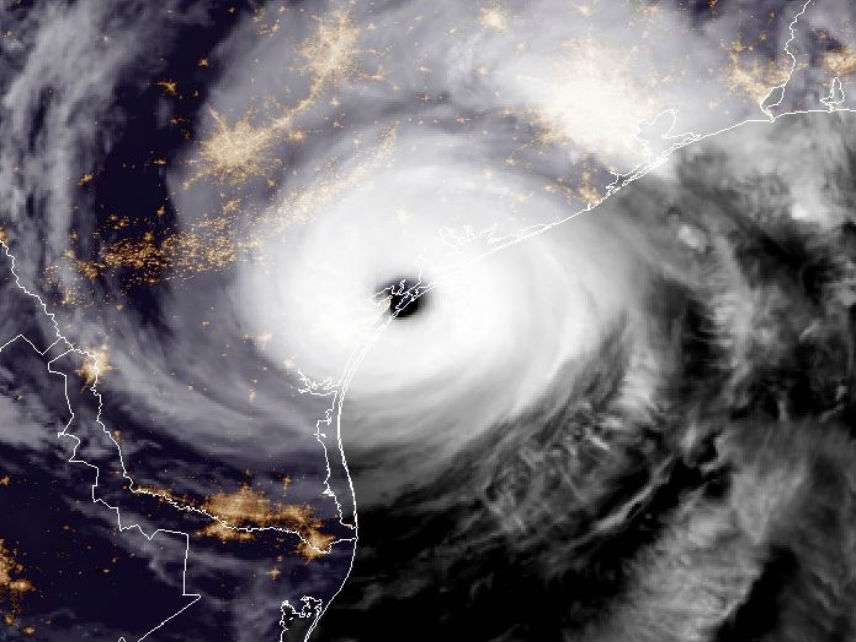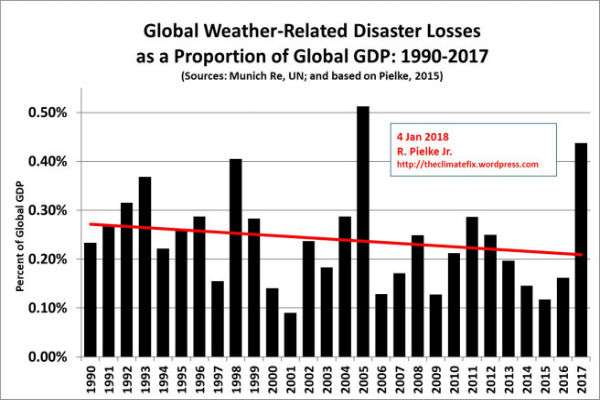2017 Was the Costliest Year Ever for Disasters in the U.S.
NOAA finds that hurricanes, fires, floods, and droughts caused $306 billion in losses last year.

2017 was "a historic year of weather and climate disasters," according to a new report from the National Oceanic and Atmospheric Administration (NOAA). Sixteen separate billion-dollar disasters hit the United States, killing 362 people and bringing losses of $306.2 billion. The majority of that figure—$265 billion—can be attributed to Hurricanes Harvey, Maria, and Irma.
That figure sets a new record, passing the $214.8 billion (inflation-adjusted) worth of damage wreaked by Hurricane Katrina and other storms in 2005.
How much did man-made climate change contribute to these losses? The Washington Post reports that
NOAA experts demurred on this question on a media call, declining to apportion how much of the damage could be attributed to a changing climate as opposed to other factors. One key factor that is also known to be worsening damage is that there is more valuable infrastructure, such as homes and businesses, in harm's way—along coastlines or in areas vulnerable to wildfire.
"For the purposes especially of this product, we do not try to parse those apart," said Deke Arndt, chief of the monitoring section at NOAA's National Centers for Environmental Information. "We're more interested in quantifying what's going on. Both the economists and physical scientists will retrospectively look at that, but those sort of happen at the speed of science."
Whatever contribution climate change may have made to last year's disaster damages, the University of Colorado political scientist Roger Pielke, Jr., has calculated that the annual cost of weather disasters as a proportion of global GDP from 1990 to 2017 has actually been falling:

That said, Pielke has also pointed out that the world, especially the U.S., has had a remarkable streak of good luck since 2005 when it comes to big weather disasters. That streak came to an end with Hurricanes Harvey, Maria, and Irma. Given growing wealth and expanding infrastructure, the mere reversion to earlier weather patterns, particularly if the historical rate of landfalling hurricanes in the U.S. recurs, would necessarily result in more losses.
"Understanding loss potential in the context of inexorable global development and long term climate patterns is hard enough," Pielke notes. "It is made even more difficult with the politicized overlay that often accompanies the climate issue. Fortunately, there is good science and solid data available to help cut through the noise. Bigger disasters are coming—will you be ready?"
Editor's Note: As of February 29, 2024, commenting privileges on reason.com posts are limited to Reason Plus subscribers. Past commenters are grandfathered in for a temporary period. Subscribe here to preserve your ability to comment. Your Reason Plus subscription also gives you an ad-free version of reason.com, along with full access to the digital edition and archives of Reason magazine. We request that comments be civil and on-topic. We do not moderate or assume any responsibility for comments, which are owned by the readers who post them. Comments do not represent the views of reason.com or Reason Foundation. We reserve the right to delete any comment and ban commenters for any reason at any time. Comments may only be edited within 5 minutes of posting. Report abuses.
Please to post comments


I find it interesting that severe cold weather does not factor into losses for the USA.
Maybe not destruction like a hurricane but business slows when these snow/ice-pocalypse events hits.
Just the cold itself probably has a noticeable effect on commerce without the cold being abnormal
A lot of outdoor things take longer if they even happen at all.
Maybe not destruction like a hurricane but business slows when these snow/ice-pocalypse events hits.
And I wouldn't put it too far out from 'destruction like a hurricane'. Certainly buildings aren't blow away in the same manner but if you told me 362 people died every year from exposure to the cold or reacquiring the skill of driving in the snow, I wouldn't be at all surprised.
One money and life-saving move: At least update the flood maps to be accurate and don't provide federal flood insurance to those who rebuild on high-risk areas.
^ Lester is on to something here.
Measuring natural disasters in terms of dollar losses is at least a bit iffy - a Category 5 hurricane hitting East Armpit, Alabama might do some small fraction of the financial damage a Category 3 hitting Miami Beach would do but it's still a more powerful storm. Not to mention which we're all aware that fixing broken windows is actually good for the economy, so the more destructive the storm, the better. Isn't that right, Mr. Krugman?
Is inflation figured in?
Looks like it is.
"That said, Pielke has also pointed out that the world, especially the U.S., has had a remarkable streak of good luck since 2005 when it comes to big weather disasters."
THAT'S BECAUSE LUCK IS RESULT OF CLIMATE CHANGE.
IS ANYONE LISTENING?!?
/Al Gore.
Bigger disasters are coming?will you be ready?"
It's kinda hard for me to be ready if, you know, I DON'T KNOW WHAT THE NATURE OF THE DISASTER IS.
Here? All I know is it hasn't stopped fucking snowing. It's like Chinese water torture. It just keeps falling and falling and falling....and falling.....and.....falling.....an......fal......
The biggest, most costliest disasters. The yugest! Believe me.
Of course the biggest of these is Harvey, accounting for well over a third of this year's losses. And therefore this is the one that is trotted out the most by climate change alarmists as the picture of our future, showing such commenters to be as unscientific as they can be.
I at least skim all the ARs as they are put out by the IPCC. I must have missed the statement that "Increasing atmospheric greenhouse gasses are very likely to cause hurricanes to stall over flat, impermeable clay, highly populated coastlines rather than cross over them as they usually have in the past."
Because that's the only way that Harvey could conceivably be blamed on climate change.
How much did man-made Trump electing contribute to these losses? That's the real question.
Trump-made climate change.
It's real.
Look it up.
Pretty sure this was a subject of one of the non-vintage whines at that H-wood sales awards meeting last night.
"Given growing wealth and expanding infrastructure, the mere reversion to earlier weather patterns, particularly if the historical rate of landfalling hurricanes in the U.S. recurs, would necessarily result in more losses."
Building really expensive homes in flood plains tends to bias the loss number, doncha' think?
Haven't looked yet; is that imbecile trueman here already?
One key factor that is also known to be worsening damage is that there is more valuable infrastructure, such as homes and businesses, in harm's way?along coastlines or in areas vulnerable to wildfire.
Calculating climate change by cost of repairing infrastructure is fundamentally retarded.
When a 700 sq foot fixer upper costs $700,000 in a blue, earthquake and storm-prone coastal state, cost of the repair is completely untethered to things like storm power and frequency.
The climate change cult wants very badly to be able to attach a price tag to individual disasters caused by global warming so that those affected can sue big oil. It doesn't matter that its mathematically impossible to do this-after all, their computer models never lie.
Well jeez, hurricanes and such cause more damage as time goes on because more stuff has been built in regions prone to hurricanes and such as rime goes on.
I hope the Bailey got around to mentioning this.
Was global warming brought up?
Exactly this. When I'm explaining to people who are saying, "OMG!1!111 COSTLIEST EVER1!!!!" I like to point out that if a Cat 3 hurricane sweeps over an empty barrier island, it does a lot less damage than a Cat 1 sweeping over the same barrier island with dozens of million dollar homes.
If you're not controlling for GDP, which you should be, those dollar losses in 2005 and 2017 are essentially the same
2017 Was the Costliest Year Ever for Disasters in the U.S.
No, no, no, Ron. We all know that this isn't really a loss, because fuck the insurance companies and think of all that extra economic activity that was created by rebuilding.
If this year's plethora of bad hurricanes was due to climate change, then so was the preceding 12 year span of wimpy hurricanes, which I believe was a record.
Does climate change really happen from one year to the next on that scale? Kinda doubt it.
The disasters in the past year have caused a lot of damage. The impact of hurricanes and floods were on all aspects life as well as property. People had to undergo a lot of reconstruction, which ultimately led to expenses. It was very helpful for people who had the flood insurance palm beach county or a home insurance. We should be prepared for all such disasters and have a survival plan ready.